
In 1926, F. Scott Fitzgerald and his family were in France, spending most of their time on the Riviera where Baz Luhrmann's movie of The Great Gatsby will open the Cannes Film Festival tonight. From far away, Fitzgerald followed closely the stage adaptation of Gatsby that Owen Davis was preparing for Broadway's Ambassador Theatre. Davis had won a Pulitzer Prize for drama in 1923 for Icebound, but didn't even come close for his Gatsby dramatization.
Compared to the novel, the play's terrible -- how can you like a version of Gatsby absent the Valley of Ashes, and in which George Wilson is the Buchanans' chauffeur? However, the play did get good reviews for James Rennie's performance as Gatsby. Rennie, a Canadian-born actor, is still best known as Dorothy Gish's husband, and remembered for smaller roles like Frank MacIntyre in Now, Voyager. He should be famous for being the first Gatsby. The New Yorker termed the play excellent and attractive, with Gatsby's death as the most intense dramatic moment then on Broadway. Rennie was shot onstage in front of his Daisy, Florence Eldredge, and told a newspaper interviewer that it was his own choice to walk toward Daisy as he was dying, smiling because her face was the last thing he'd ever see -- exactly as Gatsby would want it.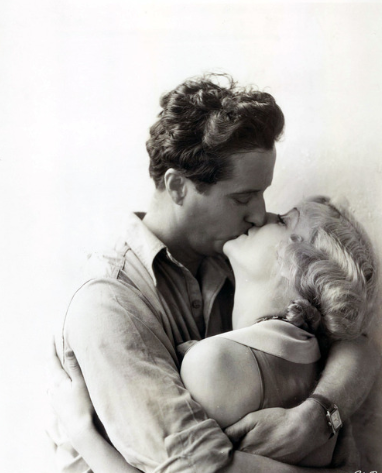
James Rennie, the first Gatsby, kisses Anna Neagle in The Little Damozel (copyright Herbert Wilcox Productions UK, 1933)
Later that year, Paramount Pictures made a movie of Gatsby with Warner Baxter as Gatsby, Lois Wilson as Daisy, Neil Hamilton (later Batman's Commissioner Gordon) as Nick, and William Powell as Wilson. The movie is lost -- many people must be looking for it right now - but we know what Scott and Zelda Fitzgerald thought of it: not much. Contemporary reviewers didn't like it either. One complained particularly of Daisy, whose subtitles evidently didn't help audiences like the character: "everyone knows that Daisy was a thoughtless, selfish young woman who, when the great Gatsby was killed, rushed away crying 'Let's get out of this!'" Baxter wasn't bad, showing both a "confident devotion to Daisy and ... loneliness that needed real acting, and got it." William Powell evidently stole the movie, though, wearing thick glasses like Dr. T.J. Eckleburg's to make his eyes look sad and weak, and also to look like the image of his "god."
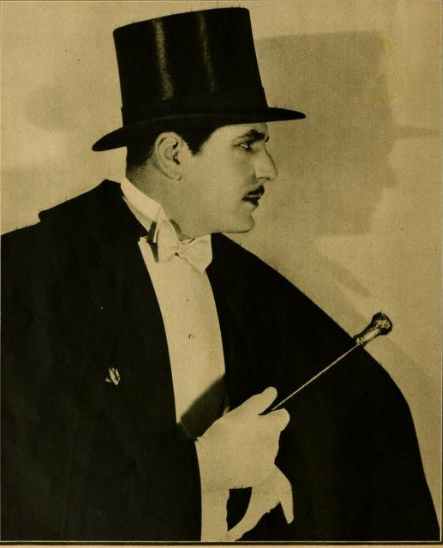
Warner Baxter as Gatsby (copyright Paramount Pictures, 1926)
In 1949, Hollywood had another go at Gatsby, with Alan Ladd, Betty Field, Ruth Hussey and Shelley Winters starring. Ladd was a top Paramount star by then, chiefly for his westerns and tough guy roles. He put the spirit of both into his edgy, angry, rags-to-riches Gatsby, but the movie itself is dreadful -- imagine Jordan and Nick, hand in hand, leaving Gatsby's grave to go back to the Midwest together.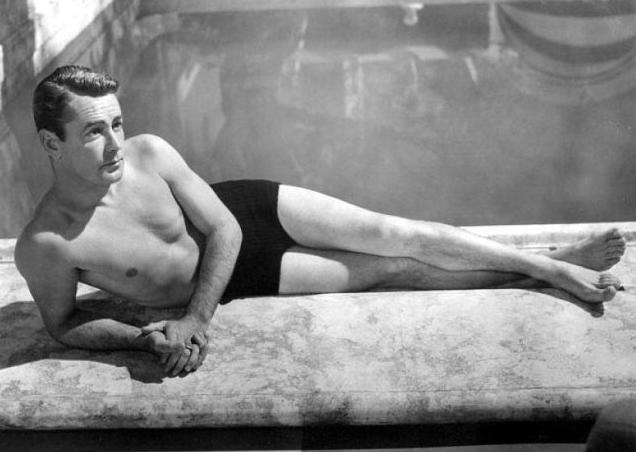
Alan Ladd, lounging by the fatal swimming pool (copyright Paramount Pictures, 1949)
Robert Redford's golden glow gave the 1974 Gatsby what permanence it still has today. The grin is perfect, the charisma always there, the costumes he wears beautiful, the sets through which he walks regal -- but Redford is a quiet Gatsby, no man of action. I'd dearly love to collapse onto his bed and bury my face in his shirts, but by that point in the movie I generally am asleep.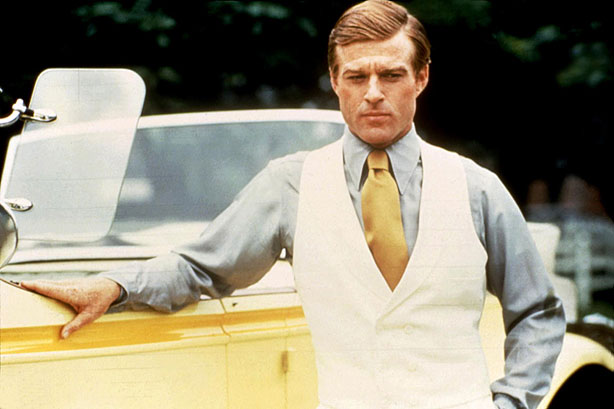
Robert Redford, gorgeous Gatsby (copyright Paramount Pictures, 1974)
I have no patience for the made-for-television Gatsby of 2000, in which Mira Sorvino looks ashamed, under her droopy hats and sweeps of long hair, to be in the company of Toby Stephens. As Daisy, Sorvino is dull; as Gatsby, Stephen is tightly wrapped and controlled, smirking with discomfort. It's right for Gatsby to be uncomfortable -- Fitzgerald makes a point of this, when we see Gatsby in multiple social situations -- but Stephens is pulled down by his constant conversations with a too-fresh-faced frat-boy Nick (Paul Rudd). Stephens has something of Ladd's gangster Gatsby about him -- the best part of both Ladd's and Stephens's portrayal -- but it gets lost in the sloppy shuffling of the story.
The Elevator Repair Service production of Gatz remains in a class entirely by itself. This play, which reads and performs every word of the novel, has been praised and revived since its inception in 2005. The star of this seven-hour show is Scott Shepherd, as Nick Carraway, but Jim Fletcher caught the humor of Gatsby -- something it had proved impossible for earlier Gatsbies to do. Fitzgerald's Jay Gatsby can be a very funny character at times: self-aggrandizing, strange, apt to say inadvertently silly things in the course of his trying too hard, chasing his dreams and illusions. Nick often laughs at him. I never fail to smile when, reading the novel, I hear Gatsby identify San Francisco as being in the Midwest. Fletcher, with his genial smile and over-the-top embodiment of that extraordinary gift for hope, in the most lurid pink suit any Gatsby's ever worn, made the man fun to be around.
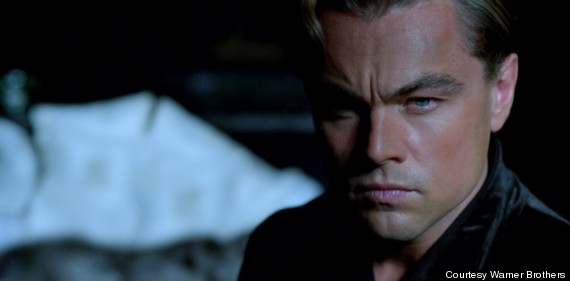
Leonardo DiCaprio as Jay Gatsby (courtesy Warner Brothers)
Now we have Leonardo DiCaprio. His Gatsby is mesmerizing, sad, amusing, romantic, scary, desperate, hopeful, doomed and almost glad of his doom: all the things Jay Gatsby is, in the novel. We first see Gatsby in the shadows, standing on the waterfront reaching for that green light, and watching Nick from his tall tower -- the man behind the curtain, not an accidental nod to Gatsby's great and powerful counterpart, the Wizard of Oz. DiCaprio's formal introduction to Nick and us, accompanied by "Rhapsody in Blue" and fireworks, has engendered both scorn and swoons -- but whatever your reaction, you must admit that the movie's all about him. Gatsby swirls all around him for the next two hours, and DiCaprio's performance is the best thing in the movie.
It makes sense that this Gatsby is a center of frantic attention and interest, a star. DiCaprio embodies that quality now, no matter the role he plays, and he's given it all to Gatsby. This Gatsby is also the "roughneck" Fitzgerald describes. When in his scene at the Plaza Gatsby nearly hits Tom, you can see his physical strength; as he washes the car that has killed Myrtle Wilson, you see his disregard for the woman with the bucket of bloody water he casually pitches into the garden ivy.

Leonardo DiCaprio as Jay Gatsby (courtesy Warner Brothers)
Most of all, DiCaprio's Gatsby is entirely American, as Fitzgerald defines this nebulous concept in the novel. The accent is unplaceable. DiCaprio has been accused of Streeping before, but it suits the role: Gatsby, Mr. Nobody from Nowhere, should sound like he's from all over the country. In Gatsby's voice are the flat Midwest, would-be Locust Valley, Southern vowels and Bronx consonants. I like that. In a passage from Chapter IV Fitzgerald labored over in the drafts of Gatsby, he describes Gatsby, famously, thus:
He was balancing himself on the dashboard of his car with that resourcefulness of movement that is so peculiarly American.... This quality was continually breaking through his punctilious manner in the shale of restlessness. He was never quite still; there was always a tapping foot somewhere or the impatient opening and closing of a hand.
As Nick and Gatsby set off for the city, "Gatsby began leaving his elegant sentences unfinished and slapping himself indecisively on the knee of his caramel-colored suit." Watch for it. As DiCaprio first drums his fingers on the dashboard, and then raps his knee as he's warming to his "God's truth" life story, Fitzgerald would be delighted.
Gatsby's own version of his American Dream, his Walt-Whitmanian song of himself, needs Daisy Fay to become reality. Alas, she's not Daisy Fay any more, but Daisy Buchanan, someone else's wife, someone's mother. DiCaprio's radiance in the one bright afternoon where he's repeating the past -- when Gatsby and Daisy play on the beach, break golf clubs, lounge under Japanese parasols and end up holding each other on his bed amidst heaps of beautiful shirts -- makes for one of the best parts of the movie. When he's lost her, after the Plaza, after Myrtle's death, this Gatsby knows it. The concern for Daisy in the wake of the accident gives way to despair, which only Nick sees. Gatsby tries to put on a good front for Nick, but he's not the great Gatsby any more. In a stunning scene, DiCaprio whispers into the telephone, mindful now that Wolfshiem's goons are somehow in control -- or perhaps admitting that they always have been. When Nick says goodbye for the last time, Gatsby barely responds; he's blocked from view by his overdone garden architecture, already on his way to the pool, already gone. As George Wilson (Jason Clarke) raises his pistol, Gatsby looks at that ringing telephone and says "Daisy," but we know it's not her -- and, from the look in his eyes, so does Gatsby. The camera lingers on DiCaprio's eyes, then backs off so you can see him touch his dark bathing suit over the heart, and watch his fingers as they come away red. In those eyes, as Gatsby finally lets go, are both incredulity -- and relief. It's the ending that should be, for the character Scott Fitzgerald called his imaginary brother. DiCaprio's performance has, finally, given us a Gatsby with "something gorgeous about him, some heightened sensitivity to the promises of life" -- a Gatsby who turns out all right in the end. Leonardo DiCaprio as Jay Gatsby (courtesy Warner Brothers)
Leonardo DiCaprio as Jay Gatsby (courtesy Warner Brothers)
